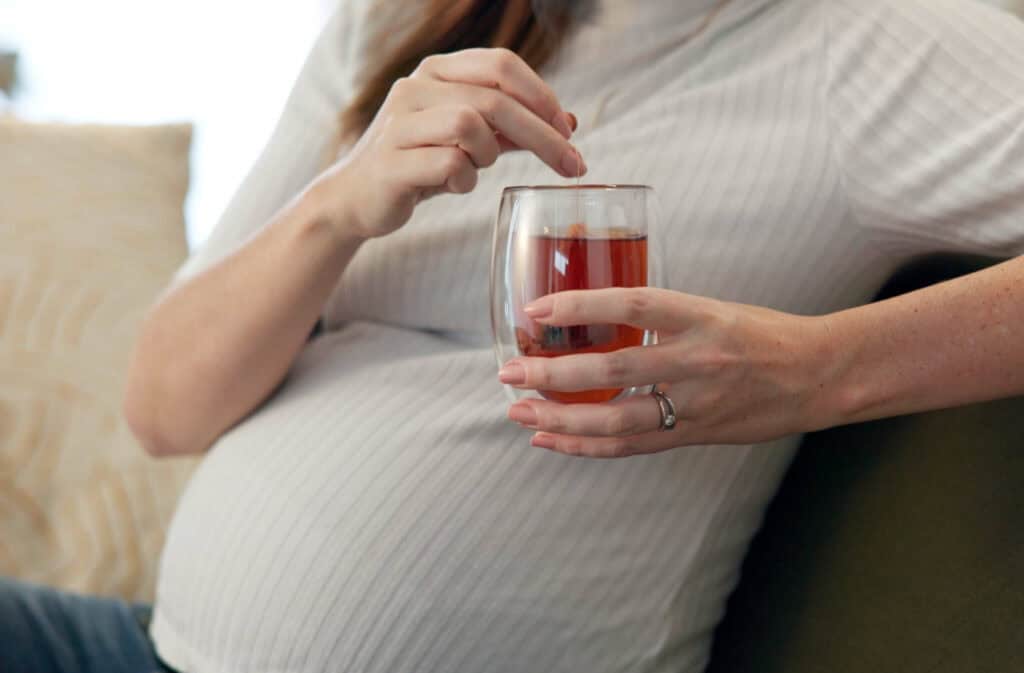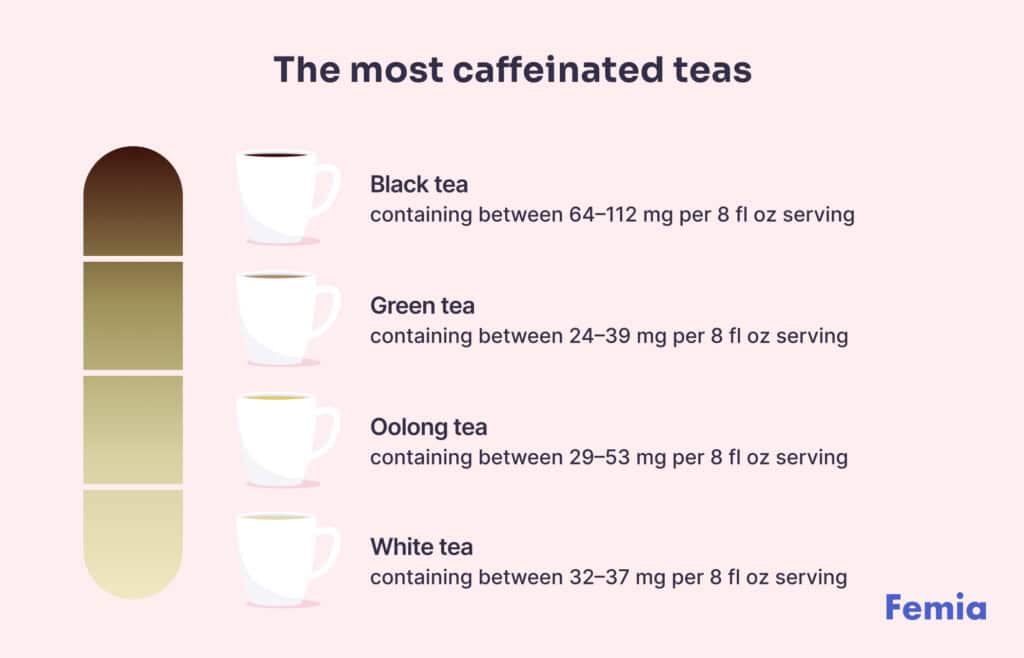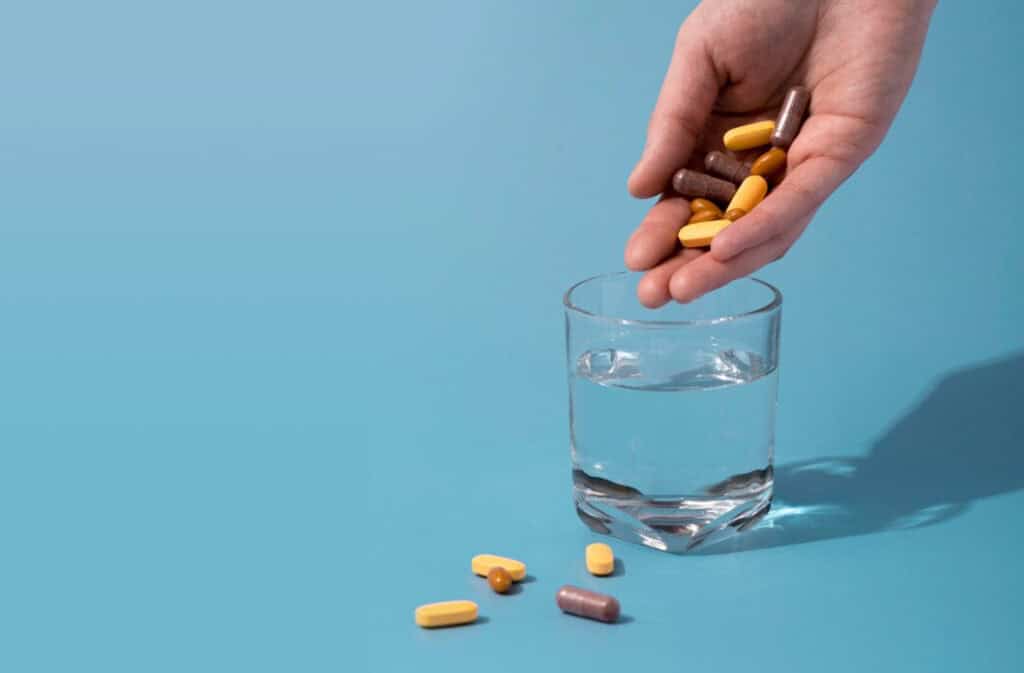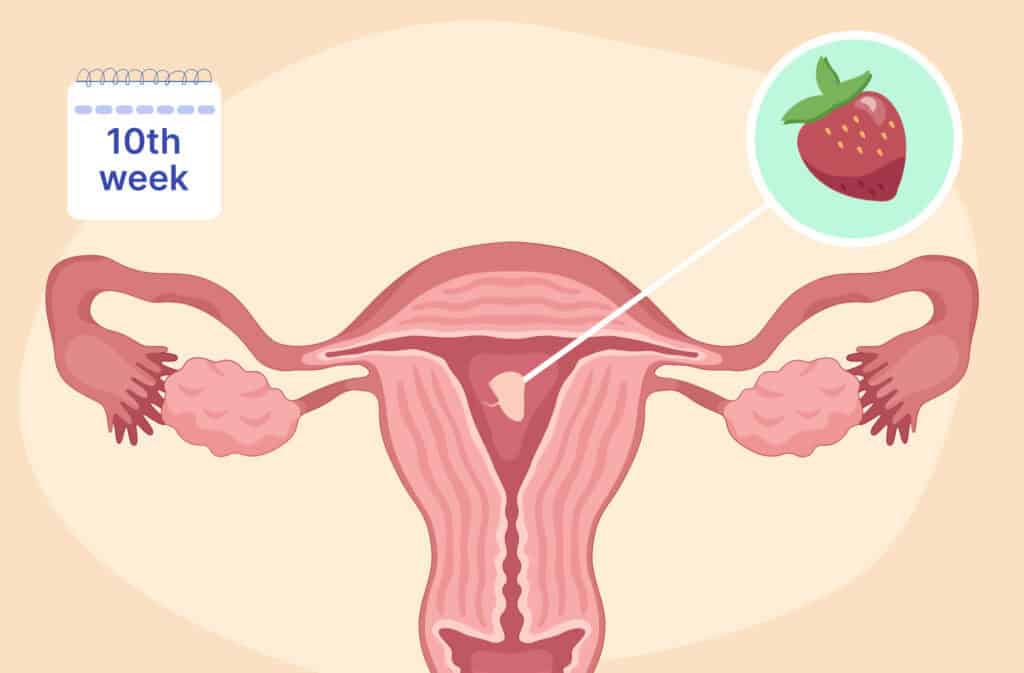Femia > Health Library > Pregnancy > Pregnancy health > Can you drink tea while pregnant? Safe teas, risks, and tips for enjoying tea during pregnancy
Can you drink tea while pregnant? Safe teas, risks, and tips for enjoying tea during pregnancy

- Updated Feb 10, 2025
- Published
CRAFTED BY HUMAN
Crafted by human At Femia, we provide accurate and up-to-date information at every stage of your journey, from trying to conceive, pregnancy and postnatal support. All content is created by a real person based on in-depth research and own professional experience. Femia ensures that you will receive expert advice, strict accuracy and a personalized approach from our authors/medical experts. Learn more about our editorial policy.
FACT CHECKED
Fact checked At Femia Health, we maintain the highest standards of editorial excellence in delivering content focused on helping you conceive, guiding you through pregnancy, and supporting you postpartum. Explore our content review principles to learn how we ensure the accuracy and quality of our health and lifestyle tips for every stage of your journey.
Drinking black, green, and most herbal tea during pregnancy is generally considered safe. However, some herbal teas should be avoided during pregnancy, such as those containing licorice root, dong quai, or ginseng. It’s also important to consider the caffeine level contained in tea to stay within the recommended daily limit of 200 mg of caffeine.
Tea is an ancient beverage that dates back many centuries. According to legends, it was originally created in China, in 2,737 BC, when a few tea leaves from a tree were accidentally blown into the emperor Shen Nung’s cup of boiling water.
From ancient tea ceremonies to simply enjoying a cup of favorite tea at home, this ritual is widely referred to as a very soothing and calming one. It’s believed to bring a sense of comfort and help reduce stress, which is why so many people love it. But, can you drink tea while pregnant? In this article, we’re going to review the safety of this beverage and tell you about some teas to avoid while pregnant to help you make healthy choices.
Femia offers a personalized meal plan, symptom tracking, and more according
to your pregnancy journey
Is tea safe during pregnancy?
Generally, drinking tea during pregnancy is considered safe in moderation. Although most teas are considered pregnancy-safe, a study on excessive tea consumption revealed that immoderate consumption even of pregnancy-safe tea was significantly associated with poor gestational weight gain starting from week 30 of pregnancy up to labor and low birth weight in babies.
These and other related studies demonstrate the importance of moderating tea intake in mothers-to-be. Also, special considerations should be taken both for caffeinated and herbal teas.
Caffeine in tea during pregnancy

Can pregnant women drink tea? The answer is not a simple “yes” or “no.” One of the first considerations is caffeine intake. Caffeine is found not only in coffee and energy drinks but also in chocolate and tea. In particular, the most caffeinated teas are:
- Black tea, containing between 64–112 mg per 8 fl oz serving.
- Oolong tea, containing between 29–53 mg per 8 fl oz serving.
- Green tea, containing between 24–39 mg per 8 fl oz serving.
- White tea, containing between 32–37 mg per 8 fl oz serving.
👉Find out more: Can you drink coffee while pregnant? Caffeine safety, limits, and benefits explained
What is the safe dosage of caffeine during pregnancy?
Although the American Pregnancy Association generally doesn’t recommend for pregnant women to consume caffeine in any form, it’s believed that a limited amount of this compound is safe—the universal pregnancy caffeine limit is set to 200 mg per day.
This limit is set based on multiple studies. According to their findings, excessive caffeine consumption can cause the constriction of blood vessels in the uterus and placenta, which can hinder blood supply to the fetus and lead to growth problems and smaller birth sizes.
Additionally, excessive caffeine can possibly hinder healthy fetal stress hormone production and lead to rapid weight gain in infants and potentially higher risks of obesity, heart disease, and diabetes.
The University of Utah Health also reports that excessive caffeine intake during the first seven weeks of pregnancy might be associated with an enhanced risk of miscarriage.
Is black tea safe during pregnancy?
Black tea is generally considered safe for pregnant women. Just like other caffeinated teas, it should be consumed in moderation, not exceeding the set daily caffeine limit. Other than that, you can enjoy your favorite comforting drink. Moreover, black tea can become a good low-caffeine option to replace your daily coffee.
Want to get more benefits from your black tea? Consider adding some milk to your beverage to balance acidity. Additionally, adding milk to antioxidant-rich tea can help you receive a number of other healthy elements, such as calcium, potassium, and vitamins D and B12, which are all important in pregnancy.
The best part is that it can also help you relieve stress. While the caffeine in black tea is known to give you an energy boost, which can trigger anxiety and increase stress levels, milk is found to have antidepressant effects. Milk casein is shown to reduce fluctuations in corticosterone and serotonin levels in your brain caused by stress.
Can I drink herbal tea while pregnant?
While the general answer to the question “Can I drink tea while pregnant?” is “yes,” we have a few special considerations when it comes to herbal teas.
Herbal teas are made of natural components, such as the roots, flowers, leaves, seeds, and berries of various plants. They are free of caffeine and are often used as remedies for different conditions. All these facts can make you feel like these natural teas are absolutely safe. However, while some of them are, many herbal teas should be avoided in pregnancy.
While caffeine isn’t an issue in the case of herbal teas, a lack of studies concerning the pregnancy safety of different plants is. Currently, there is a lack of data on how many herbs may affect mothers-to-be and fetus development. Due to this reason, it’s important to consult with a healthcare provider before consuming herbal teas (especially herbal blends) that aren’t explicitly stated to be safe.
What tea is safe during pregnancy?
Now that you know that there are safe teas that you can drink while pregnant, as well as those that should be avoided, the main question is “What tea can I drink while pregnant?”
Here’s your pregnancy-safe tea guide to keep at hand:
- Ginger tea is considered generally safe for pregnant women, and you can drink up to four cups of it per day. Furthermore, studies have shown that this beverage can improve nausea by around 4 points on a 40-point scale and ease vomiting for 1 in 3 women. Combined with some foods that help fight nausea, it can be a good natural remedy for making you feel better.
- Peppermint tea is also one of the safe teas. It’s commonly used in pregnancy thanks to a number of benefits it offers, such as flatulence relief, digestion improvement, morning sickness relief, and antispasmodic and sedative properties.
- Rooibos tea is naturally free from caffeine and rich in antioxidants, which makes it another great option for pregnant women. It’s shown to lower blood glucose levels, enhance lipid profiles, and boost antioxidant status.
- Black, green, and white teas are generally safe and can be great comforting and low-caffeine replacements for coffee to give you an energy boost. However, it’s crucial to consider their caffeine content before brewing another cup, and make sure you are only consuming up to 200 mg of caffeine a day.
Teas to avoid while pregnant
Now that you have a list of safe options, here are a few tips on what to steer clear of:
- Herbal teas that contain unsafe ingredients, such as licorice root, dong quai, or ginseng. These components might cause hormonal fluctuations and uterine contractions that might hinder fetus development and even cause a miscarriage when consumed in large amounts. Hence, they should be avoided alongside unsafe foods that are known to cause complications.
- Detox or weight-loss teas might be hiding some unsafe ingredients inside them or contain too much caffeine. Additionally, they might affect your gestational weight gain and fetus development.
- Green tea, though is safe in moderate amounts, can be harmful when you drink too much of it. In excess, this beverage is shown to decrease your folate absorption rate, leading to a lower amount of folic acid reaching the baby and a higher risk of developing neural tube defects.
How to enjoy tea safely during pregnancy
As you already know, drinking some types of tea during pregnancy can not only be safe but actually bring various benefits. For example, ginger tea is known to aid with upset stomachs, be it first-trimester morning sickness or third-trimester nausea, and peppermint tea is known for its digestive benefits.
Now, the question is, how do you enjoy these and other benefits safely? Here are a few key tips for drinking tea responsibly:
- Control your caffeine intake to stay within the generally recommended limit by consuming up to 1–2 cups of caffeinated tea per day.
- Choose pregnancy-safe herbal teas that don’t contain caffeine to enjoy your favorite comforting drink without receiving excess caffeine.
- Opt for certified organic teas to steer clear of potentially harmful pesticides.
👉Find out more: Can you ride roller coasters while pregnant? Understanding the risks of early pregnancy
When to consult a doctor about tea consumption
Now you know about some pregnancy-safe and unsafe teas. This information can help you guide your choices during pregnancy to ensure that no harm can be done to you or your baby. Still, it’s important not to neglect personalized guidance and advice when it’s needed.
Namely, we recommend talking to your doctor if you are not sure about certain herbal teas. Discussing tea safe for pregnancy with your healthcare provider will help you be certain you are picking safe options.
Also, it might be a good idea to see a doctor if you have any underlying medical condition, such as high blood pressure or preterm labor risks. In this case, even generally safe beverages might pose a risk, so it’s important to get personalized advice.
Femia offers a personalized meal plan, symptom tracking, and more according
to your pregnancy journey
Questions from the Femia community
Can I drink iced tea while pregnant?
Yes, it’s safe to enjoy your tea both hot or iced as long as you stay within the recommended daily caffeine limit and avoid any unsafe herbal ingredients.
Are fruit-infused herbal teas safe during pregnancy?
Most fruit-infused teas, such as citrus tea or berry tea, are made with pregnancy-safe ingredients and can be consumed. However, it’s crucial that you check ingredient labels for potentially harmful herbs and consult with a healthcare provider if you have any doubts.
Can tea help with hydration during pregnancy?
Yes, tea can help you intake sufficient fluid per day. Still, for proper hydration, it’s important to drink enough plain water. The general rule of thumb is to drink 8 to 12 cups (64 to 96 ounces) per day.
Is matcha tea safe during pregnancy?
Yes, matcha tea is considered safe for pregnant women. However, it’s important to note the high level of caffeine contained in this beverage and limit its daily intake accordingly.
The bottom line
So, can pregnant women drink tea? The answer is certainly “yes.” Tea is a comforting and soothing beverage that can bring multiple benefits to pregnant women, and most teas are considered safe for mothers-to-be and their babies.
Nevertheless, there are a few considerations to keep in mind to stay on the safe side. Namely, it’s important to drink caffeinated teas in moderation to prevent excess caffeine intake. As for herbal teas, it’s important to pick safe options that contain well-researched herbs, such as ginger or rooibos. And, of course, it’s important to know about unsafe herbal teas that should be avoided, and consult with a doctor if you aren’t sure about a specific tea or for personalized advice that considers your unique health condition.
References
- Jasim SK, Al-Momen H, Alqurishi AK. “Effects of excessive tea consumption on pregnancy weight gain and neonatal birth weight.” Obstet Gynecol Sci, Jan. 2021. https://pmc.ncbi.nlm.nih.gov/articles/PMC7834757/.
- “Caffeine While Pregnant.” American Pregnancy Association. https://americanpregnancy.org/healthy-pregnancy/is-it-safe/caffeine-and-pregnancy/.
- “Moderate daily caffeine intake during pregnancy may lead to smaller birth size.” National Institutes of Health. https://www.nih.gov/news-events/news-releases/moderate-daily-caffeine-intake-during-pregnancy-may-lead-smaller-birth-size.
- “THE IMPACTS OF CAFFEINE ON MISCARRIAGE.” University of Utah Health, 30, Mar. 2016. https://healthcare.utah.edu/healthfeed/2016/03/impacts-of-caffeine-miscarriage#:~:text=And%20the%20study%20found%20women,with%20University%20of%20Utah%20Health.
- Joung JY, Song JG, Kim HW, Oh NS. “Protective Effects of Milk Casein on the Brain Function and Behavior in a Mouse Model of Chronic Stress.” J Agric Food Chem, 17, Feb. 2021. https://pubmed.ncbi.nlm.nih.gov/33496183/.
- Lindblad AJ, Koppula S. “Ginger for nausea and vomiting of pregnancy.” Can Fam Physician, Feb. 2016. https://pmc.ncbi.nlm.nih.gov/articles/PMC4755634/.
- Nataliia Yermolovych. “Top foods to fight nausea during pregnancy: A first trimester survival guide.” Femia, 3, Oct. 2024. https://femia.health/health-library/pregnancy/pregnancy-health/foods-that-fight-nausea-during-pregnancy/.
- Terzioglu Bebitoglu B. “Frequently Used Herbal Teas During Pregnancy – Short Update.” Medeni Med J, 2020. https://pmc.ncbi.nlm.nih.gov/articles/PMC7384490/.
- Afrifa D, Engelbrecht L, Eijnde BO, Terblanche E. “The health benefits of rooibos tea in humans (aspalathus linearis)-a scoping review.” J Public Health Afr, 1, Dec. 2023. https://pmc.ncbi.nlm.nih.gov/articles/PMC10774856/.
- Hector Chapa. “Which food can cause miscarriage: A comprehensive guide.” Femia, 31, Jul. 2024. https://femia.health/health-library/pregnancy/pregnancy-health/which-food-can-cause-miscarriage/.
- Lori Wolfe. “Should Pregnant Women Get the Green Light to Drink Green Tea?” Mother to Baby, 6, Mar. 2018. https://mothertobaby.org/baby-blog/should-pregnant-women-get-the-green-light-to-drink-green-tea/#:~:text=Studies%20have%20shown%20that%20when,risk%20for%20having%20a%20NTD.
- Nataliia Yermolovych. “Third-trimester nausea: Why it returned and how to find relief.” Femia, 3, Sep. 2024. https://femia.health/health-library/pregnancy/pregnancy-health/third-trimester-nausea/.
- “How much water should I drink during pregnancy?” The American College of Obstetricians and Gynecologists, Oct. 2020. https://www.acog.org/womens-health/experts-and-stories/ask-acog/how-much-water-should-i-drink-during-pregnancy#:~:text=During%20pregnancy%20you%20should%20drink,Water%20has%20many%20benefits.

Let’s learn how two key female hormones – progesterone and estrogen – differ, how they affect different functions, and why they matter.

Learn how PCOS supplements such as inositol, omega-3, and folic acid can help manage your PCOS symptoms and improve fertility.

Discover what’s happening at 10 weeks pregnant, including baby’s growth, symptoms you may feel, and when you may hear a heartbeat.

